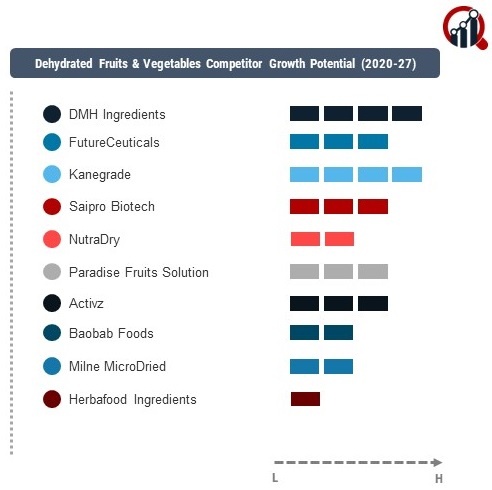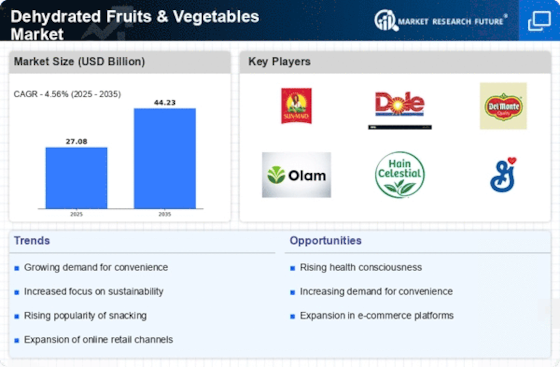Top Industry Leaders in the Dehydrated fruits & vegetables market

Strategies Adopted by Dehydrated Fruits & Vegetables Key Players
The dehydrated fruits and vegetables market is a vital segment in the global food industry, offering convenience and extended shelf life to consumers while preserving the nutritional value of produce. Key players in this market strategically position themselves to cater to the growing demand for healthy and convenient food options. This analysis provides an overview of the competitive landscape, covering key players, strategies, market share factors, emerging companies, industry news, current investment trends, and a notable development in 2023.
Key Players:
DMH Ingredients
FutureCeuticals
Kanegrade
Saipro Biotech
NutraDry
Paradise Fruits Solution
Activz
Baobab Foods
Milne MicroDried
Herbafood Ingredients
The dehydrated fruits and vegetables market adopt various strategies to maintain and enhance their market positions. Strategies encompass vertical integration to control the entire supply chain, product innovation to meet diverse consumer preferences, and strategic partnerships to expand market presence. For example, Olam International has been investing in sustainable sourcing practices for raw materials, aligning with consumer preferences for ethically and environmentally responsible products. Such strategies contribute not only to meeting consumer demands but also help companies differentiate themselves in a competitive market.
Market Share Analysis:
The dehydrated fruits and vegetables market involves evaluating multiple factors impacting competitive positioning. Key considerations include the quality and variety of dehydrated products, adherence to food safety standards, distribution efficiency, brand recognition, and the ability to cater to diverse applications. Companies that effectively balance these factors are better positioned to capture and retain a significant share of the market. Additionally, factors such as compliance with industry regulations, effective marketing strategies, and responsiveness to emerging consumer trends contribute to market differentiation and influence consumer choices.
News & Emerging Companies:
The dehydrated fruits and vegetables market has witnessed the emergence of new and innovative companies, reflecting the industry's adaptability and potential for growth. In 2023, emerging players like Naturex (a Givaudan Company) entered the market with unique formulations of dehydrated fruits and vegetables, gaining attention for their focus on natural and clean-label solutions. These newcomers contribute to the market's diversity, challenging established players and fostering innovation in the dehydrated produce sector.
Industry Trends:
The dehydrated fruits and vegetables market revolve around innovation, sustainability, and addressing the demand for natural and nutritious products. Key players are investing in research and development to create novel dehydration technologies that retain maximum nutritional value, exploring advanced packaging solutions to enhance product shelf life, and adopting sustainable sourcing practices to minimize environmental impact. Additionally, investments in marketing and promotional activities contribute to building awareness about the benefits of dehydrated produce and increasing its adoption across various consumer segments.
Current investment trends also highlight the importance of corporate responsibility and traceability. Companies are investing in supply chain transparency, engaging in fair trade practices, and ensuring traceability from farm to consumer. This not only addresses growing consumer concerns about the origin and sustainability of food products but also positions companies as responsible and ethical players in the global dehydrated fruits and vegetables market.
Competitive Scenario:
The dehydrated fruits and vegetables market is marked by robust competition among key players striving to establish themselves as leaders in this dynamic sector. Companies differentiate themselves through a combination of product quality, innovation, sustainability practices, and a keen understanding of diverse market needs. The market is also influenced by factors such as global distribution networks, research and development capabilities, and the ability to adapt to changing consumer preferences, especially in an industry where health and convenience are paramount.
Recent Development
The dehydrated fruits and vegetables market was Nestlé S.A.'s announcement of a strategic collaboration with a prominent technology company to implement blockchain technology in its supply chain. This collaboration marked a response to the increasing demand for transparency and traceability in the food industry. The implementation of blockchain technology allowed Nestlé to enhance visibility into its dehydrated produce supply chain, providing consumers with detailed information about the sourcing and processing of the products.
Nestlé's strategic collaboration underscored the importance of leveraging technology to address consumer concerns about food safety and sustainability. The development positioned the company not only as a global supplier of dehydrated fruits and vegetables but also as a pioneer in utilizing advanced technologies to ensure transparency and traceability in the supply chain. This move not only enhanced Nestlé's market presence but also contributed to shaping the dehydrated fruits and vegetables market by setting a precedent for adopting innovative solutions to meet evolving consumer expectations.











